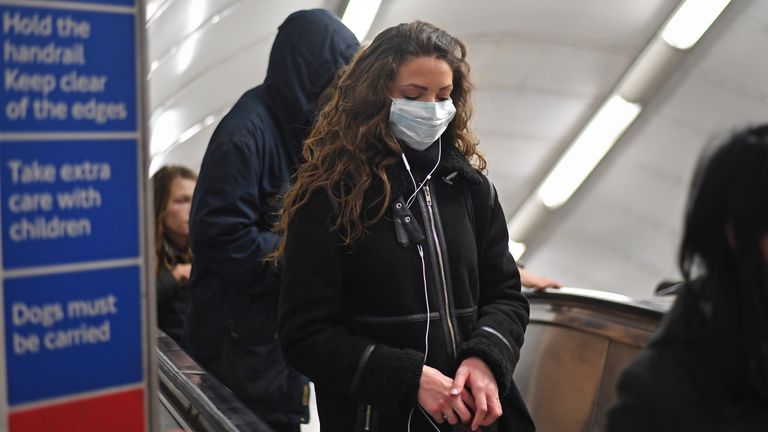Coronavirus: The objects that help spread COVID-19
Experts have suggested that COVID-19 could survive on some hard surfaces and objects for upwards of 24 hours.
Saturday 11 April 2020 06:39, UK
Door handles, escalator handrails and self-service checkouts are all objects we touch often that could become key to containing the spread of the coronavirus. But what about the belonging many of us barely put down?
While the precise lifespan of COVID-19 on hard objects and surfaces has not been determined, some experts have suggested that it could survive for upwards of 24 hours.
The World Health Organisation (WHO) recently warned that banknotes may become a public health risk because of the rate at which they change hands, picking up all manner of bacteria and viruses along the way.
So could our mobile phones pose a similar risk?
Your phone would have to be passed around to many people for this to be the case.
Dr Michael Head, a senior research fellow in global health at the University of Southampton, said there was little evidence on whether phones could spread viruses.
"Phones are difficult to clean, and transmission is clearly theoretically possible, but not likely to be an extensive route for new cases," Dr Head said.
"Viruses don't appear to survive very long on phone surfaces, and they [phones] are typically not passed around too much from person to person."
Professor Robert Dingwall, a public health expert at Nottingham Trent University, agreed - but said certain factors such as personal hygiene could increase the risk of phones spreading the infection.
For instance, it would be "pointless" to bring your phone into the toilet, wash your hands and touch your phone again. He said it was also important to keep your phone to yourself and wipe it down regularly (though do your research - as some types of wipes can damage phone screens).
Dr Simon Clarke, associate professor in cellular microbiology at the University of Reading, said it was widely known that phones were extremely dirty, but that they would unlikely pass on a virus by being placed on a surface that someone else would later touch - such as a Tube pole or office desk.
"What you'd need to look out for is if you put it down on your desk and someone coughed on it," he said.
Where else could the coronavirus find a home?
Dr Ben Killingley, consultant in acute medicine and infection at University College London, said studies of how flu survives outside the human body could be crucial to understanding the new coronavirus.
Scientists have been studying the transmission of flu for years, including going into homes and schools, swabbing remote controls, door knobs and other hard objects to examine how the illness sustains itself.
It tends to survive best on hard metal and plastic surfaces, and COVID-19 is thought to behave similarly.
That could mean things like escalator handrails, self-service checkouts, door handles, touch screens at fast food restaurants and cinemas, and vending machines.
"The definite message from when we go into living rooms and schools (for our flu studies) is that we can recover virus from everyday touched objects," said Dr Killingley.
"There might not always be a lot of virus, but we can certainly find it."
How long could the coronavirus survive on such objects?
Key to the virus' lifespan is that it stays at a reasonable temperature and remains quite moist.
"It is really variable how long it might survive on a surface for," Dr Killingley told Sky News.
"It can depend on the nature of the surface, the temperature, the humidity. It could be hours, certainly enough time for people to touch it and potentially become infected.
"Flu survives less well on your hands, because it actually dries from your hands quite quickly, but because of how often people touch their face - some 15 times an hour - that would be enough to potentially infect yourself."
How likely is it that you could be infected from an object?
Some schools and businesses that have reported cases of the coronavirus have undergone a deep clean to limit the potential risk of contamination.
Dr Killingley said it could be a "lottery" as to how people become infected with COVID-19, but that your chances of getting infected from an object could be limited by your own personal hygiene.
:: Listen to the Daily podcast on , , ,
"The chance of touching one thing and getting infected is pretty low," he told Sky News.
"It would be pretty unlucky, (but) it's a bit of a lottery. It's really the cumulative risk of touching lots of things, and then it comes down to how much you touch your face.
"That's where the hand hygiene message comes in. If you're touching things and then only washing your hands every hour or so, that might not be enough."
One thing you should not rely on to protect you is a mask.
"You can understand why people are doing it - every picture you see you see people are wearing face masks - but masks don't protect you from infection," said Dr Killingley.
"They are useful for healthcare workers because we change them regularly. We wouldn't wear a mask for any longer than 30 minutes.
"But someone wearing the same mask all day and still touching their face... the best bet is to follow the public health campaign and do the easy thing, which is to wash your hands."









